The dividing lines over Scotland's gender laws
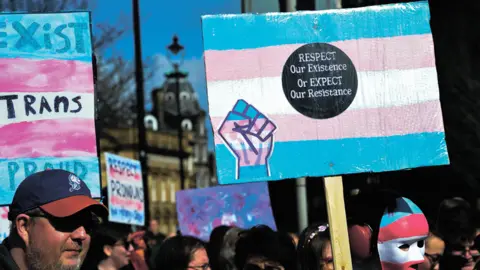 Getty Images
Getty ImagesThe Scottish government is proposing to make it easier to legally change gender. Supporters say the plans are vital to ensure transgender people are treated with dignity - but one woman who used hormones and surgery to become a man, only to regret the decision, has described the proposed reforms as "dangerous".
Sinead Watson says she didn't have any issues with her gender as a child.
It wasn't until she began to grow into a woman in her teens that a feeling of insecurity took hold, and she began to dislike her body and feel uncomfortable in her own skin.
When she was in her early 20s, she told BBC Scotland's The Nine, she typed into Google "something along the lines of 'I'm a woman, I wish I was a man'."
The results page introduced Ms Watson to the concept of gender dysphoria, defined by the NHS as discomfort or distress caused by a mismatch between biological sex and gender identity.
She says she read the list of symptoms - such as feeling a disconnect from one's body and resentment for one's sexual characteristics - and thought: "That's what I have."
After consulting her GP, Ms Watson was referred to the Sandyford gender identity clinic in Glasgow, one of four in Scotland (the others are in Edinburgh, Inverness and Aberdeen). It is also home to the nation's only such facility for children.
"I was very aware that I wasn't going to literally change my sex, but I thought if I could transform to such an extent that I passed and lived socially and legally as male [then] it would solve all the problems I had," she says.
Over the next few years, Sinead had counselling sessions at the Sandyford; changed her name to Sean; began taking testosterone; and finally, after two years on an NHS waiting list, had surgery to remove her breasts.
"After the double mastectomy in 2017, there was a period of bliss," she says. Soon though "the novelty of that wore off and I thought, you know, why do I still hate myself?"
For Ms Watson the three years since have been painful. She has now concluded that transitioning was a terrible mistake, that she did not in fact have symptoms of gender dysphoria but individual physical and psychological issues which should, she says, have been diagnosed and treated as such.
For now Sinead remains, legally at least, Sean. She changed her gender on her passport and her driving licence but not her birth certificate and is now trying to figure out how to change them back.
Ms Watson says she has serious concerns about a proposed change in the Scotland's laws that would make it easier to change a birth certificate from male to female or vice versa, and potentially to lower the age at which you could do so from 18 to 16.

What are the laws?
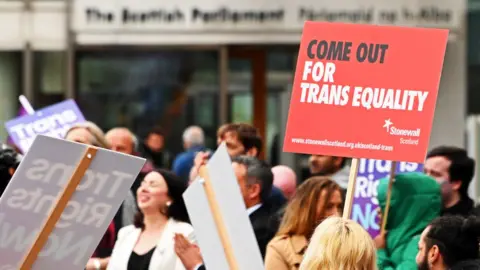 Getty Images
Getty ImagesSince 2005, trans people have been able to apply to a UK tribunal called the Gender Recognition Panel for a gender recognition certificate to allow them to amend their birth certificate (passports and driving licences can be changed more easily).
Typically, at present, successful applicants must obtain a diagnosis of gender dysphoria and must swear an oath that they have been living in their new gender for two years and that they intend to do so for the rest of their life.
They must provide one medical report outlining their diagnosis and a second detailing any relevant treatment or surgery. Other information, such as utility bills to prove how they have been living, can also be requested by the panel.
The Scottish government is proposing to relax some of these requirements, making the process "less onerous".
Under the proposals applicants would no longer need a clinical diagnosis or medical reports, and the two-year period would be reduced to three months. This would be followed, if an application was accepted, by three months for reflection before the gender recognition certificate was issued.
Cases would be handled by the Registrar General for Scotland, removing the need to apply to the panel.
Applicants would still have to swear an oath confirming that they intended to live permanently in their acquired gender, and making a false statement would be a criminal offence.

Ms Watson regards some aspects of the proposed new legislation as "dangerous" and voices concerns that many more people will end up in her situation as the number of people transitioning rises.
She worries especially that young people are being pushed towards a diagnosis of gender dysphoria by a combination of well-meaning doctors and politicians, and the warm embrace of online trans communities.
"It's like social contagion," she says, recounting her own experience. The system was geared up to help her transition, she argues, but not to help her when she began to have doubts.
"I got next to no support off mental health professionals. They seemed very uncomfortable whenever I discussed transition regret. So I'm really fortunate that I have amazing loved ones that were there to help me. I probably wouldn't be here without them, to be honest."
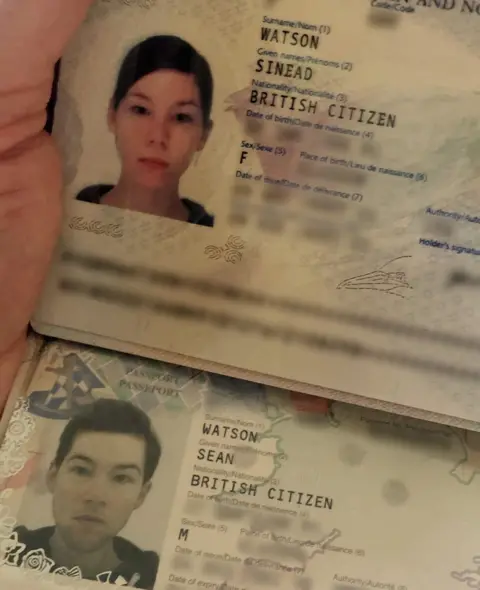

Ms Watson said she was particularly worried about the idea that the age limit for legally changing gender could be lowered to 16.
"If you don't actually have gender dysphoria and you go down that route you end up like me, where you've irreversibly changed your body with hormones and surgery and you feel humiliated, you feel ashamed of yourself and you feel completely betrayed by the people that allowed this to happen," she says.
NHS Greater Glasgow and Clyde, which runs the Sandyford, said the clinic follows internationally-agreed guidelines. Patients undergo full assessments by psychiatrists, sexual health doctors, psychologists and occupational therapists including multiple engagements over an extended period to ensure they fully understand the process.
It said treatment and support were tailored to individual needs, and patients were regularly referred to services out with the clinic for other health needs, including mental health conditions.
How many people actually de-transition is in dispute. Ms Watson says she has spoken to "dozens and dozens" and is in a group chat with about 50 de-transitioners, although the nature of social media and a desire for anonymity makes it difficult to verify their stories.
Academic research estimates that the total number of people who have de-transitioned in Scotland is between 18 and 36, or between 1% and 2% of those who transition.
Similarly to Sinead, Emily Frood says she had no idea she was transgender until she was 17 years old.
She was born as a boy and had lived her childhood content with her sex until one day, "it suddenly kind of clicked".
"I'd never thought about it before… because I had no experience and knowledge of trans people," Ms Frood says, adding with a smile: "It is really bonkers."
Now 21, Ms Frood is in her final year of film and media studies at Queen Margaret University in Musselburgh, East Lothian, and her appearance has changed dramatically.
Not only is she wearing make-up and a colourful blouse but hormone therapy has stopped the growth of facial hair and redistributed muscle and fat, changing the shape of her body and the contours of her face.
Ms Frood, who hopes one day to win a seat in the Scottish Parliament for the Green Party, uses the personal pronoun "she" and calls herself a trans woman, but she describes herself as "non-binary" - meaning she does not identify as either male or female.
"For trans people," she says, "the lines get blurred a little."
"I personally don't identify fully with womanhood in a binary way, but kind of somewhere in between that. Just not man. If that makes sense."
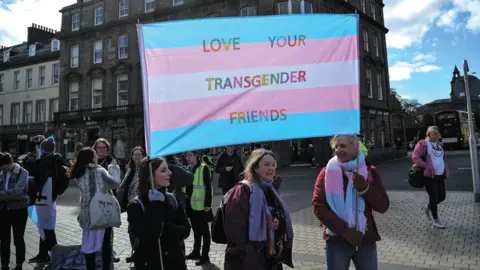 Getty Images
Getty ImagesThe current heated discussion about transgender rights suggests there are many people in the country for whom this does not in fact make sense.
"The kind of anti-trans rhetoric that comes up especially in newspapers and print media is horrendous," says Ms Frood.
Self-harm and suicide "are all too common in our community because the progression of our rights is framed as a debate", she says.
She regards critics who insist gender is an immutable biological fact defined by physical characteristics at birth as ill-informed at best.
"Anyone who has either studied more than higher grade biology or had any kind of introduction to sociology will understand that gender doesn't work like that and neither does sex," she says.
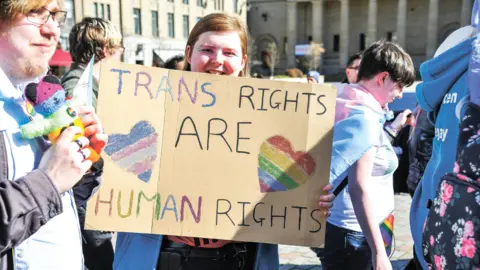 Getty Images
Getty ImagesFor Ms Frood the proposed legislative changes are welcome but don't go far enough. An initial consultation included a recommendation that the Scottish government should recognise non-binary people in law but ministers now say they do not intend to do so.
"We were gutted, completely let down and it's quite shameful, to be honest," says Ms Frood.
"To see that result in a consultation response was incredible and for it to be totally ignored was devastating."
There is not a definitive figure for the number of transgender people in Scotland but an NHS report published in May 2018 cited an estimate of 0.5% of the population, or some 24,000 adults.
The report said the number of trans people accessing NHS gender identity services had risen sharply between 2014 and 2017.
From 2014 to 2015 the number of children aged 16 and below being referred with gender issues more than doubled from 63 to 128.
By the end of the period surveyed there was some indication that the rate of increase was slowing but published data is so scarce that it is hard to be sure.
For James Morton, manager of the Scottish Trans Alliance, a Scottish government-funded project which campaigns for improved rights for transgender people, the changes, while not perfect, are a welcome step forward.
"I've gone through the gender recognition process myself and got a gender recognition certificate and it was really humiliating and really frustrating," he says.
Mr Morton says in his case a deeply intrusive psychiatric report was rejected as not detailed enough because, for example, he had not detailed what toys he played with as a child or revealed whether or not he had a sexual partner.
"What has that got to do with how I'm living my life?" he asks.
The government is also consulting on one proposal to reduce from 18 to 16 the age at which people can apply to legally change their gender and another to draw up guidance to "protect and promote" the rights of trans pupils in schools.
For Rhona Hotchkiss that is a worry.
"You can't buy a pack of cigarettes or drink a pint at 16, but you can make a decision that will affect the rest of your life," she says. "It just seems bizarre."
Ms Hotchkiss became interested in the debate about transgender rights when she was governor of Cornton Vale women's prison near Stirling.
"My experience is that it is always an issue to have trans women in with female prisoners," she says. This was not just because of what she describes as the occasional "physical or sexual threat" but also because "the very fact of the presence of a male-bodied person" among vulnerable women causes "distress and consternation".
Ms Hotchkiss says she accepts that calling trans women "male-bodied" may cause offence and says she has "no wish to disparage" anyone, but insists that most trans prisoners "have done nothing to change their physical appearance, or very little".
"The vast majority of women in prison have been traumatised by male violence, and they are threatened by having a male-bodied person in what is quite an intimate living space," she says.
Ms Hotchkiss says she has witnessed aggression from trans prisoners including threats to rape female staff and prisoners, but is not aware of anyone actually being attacked by a trans prisoner in Scotland.
At present a trans woman does not have a legal right to insist on being placed in a women's prison but the former governor says she is concerned that the current consultation may open up a path to that changing, making it harder, she argues, to keep women safe.
However, the Scottish Prison Service insists that acquiring a gender recognition certificate "does not and will not give a prisoner any new legal rights regarding the decisions that are made by the Scottish Prison Service about their accommodation".
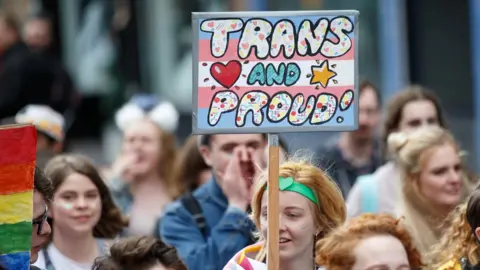 Getty Images
Getty ImagesMs Hotchkiss is one of a number of high profile lesbian, feminist activists who have attracted opprobrium for taking what other feminist activists see as the wrong side in this debate.
She says that her belief that "it is not possible for a man literally to become a woman" has resulted in her being attacked online as "a racist, a fascist, a Nazi, a bitch" and "much worse words than that".
Mr Morton points out that transgender people have also been threatened with violence and even attacked.
"But I don't think there should be a competition," he adds. "It's unacceptable for anybody to be being abusive towards anybody else and I want all of that to stop."
He says most of the abuse is online and urges everyone involved in the debate to step away from Twitter, which he regards as a toxic forum.
Mr Morton argues that women are not going to be put at risk in prisons, insisting that the legal ability to keep a trans woman in a male facility or a transgender facility based on individual risk assessments will remain.
"There's usually only about 15 to 20 trans people in the Scottish prison system so it's not an unwieldy number of people to do in-depth, individualized assessments of," he says.
Mr Morton reckons there is a "moral panic" about transgender people which has echoes of the battle, 20 years ago, over Section 28 of the Local Government Act which prevented state schools from teaching that homosexual relationships were acceptable.
The Scottish government consultation, which has clearly generated passion, discomfort and even anger, closes on 17 March.
If you are affected by any of the issues raised in this article, you can find support and advice via BBC Action Line.
